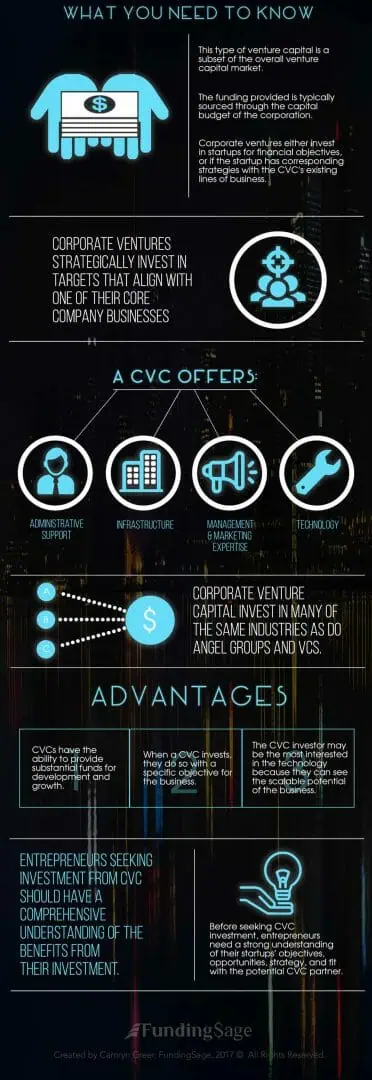Typical venture capital businesses are founded with the goal of investing in startups in order to generate good returns for investors. The parent firm is still aiming for a positive return in the case of corporate venture capital (CVC) funds, but there are also major strategic considerations when evaluating possible investments. Investing in startups allows companies to be more flexible in their approach to pursuing growth prospects without having to create new teams and divisions from the ground up. Before making larger investments, they can make minor investments in startups to test new segments or technology.
What Is Corporate Venture Capital?
Corporate venturing, often known as corporate venture capital (CVC), is the practice of investing directly in external startup companies with corporate cash. Large corporations typically do this when they want to invest in small, but innovative, startup companies. They do it by entering into joint venture agreements and purchasing equity holdings. The investing firm may also give managerial and marketing experience, strategic guidance, and/or a line of credit to the business.
The meaning of CVC is frequently clarified by stating what it is not. Even though the investment vehicle is backed by a single investing business, an investment made through an external fund managed by a third party is not deemed to be corporate venture capital. Most notably, CVC is not the same as Venture Capital (VC), instead, it is a specific subset of it.
Characteristics of Corporate Venture Capital In Malaysia
The goal of corporate venture capital in Malaysia and the degree to which the investment company's and the startups' operations are intertwined. Venture Capital (VC) investments typically advance one of two core purposes, despite the fact that corporations have a variety of objectives for their VC investments. Some investments are strategic, they are undertaken primarily to boost the corporation's own sales and profits. A corporation making a strategic investment wants to find and capitalise on synergies with a new endeavour.
The other type of investment goal is financial, in which a corporation is primarily searching for high returns. Due to what it regards as its superior knowledge of markets and technology, solid balance sheet, and ability to be a patient investor, a corporation wants to do as well as or better than private VC investors. Furthermore, a company's brand may serve as a signal to other investors and future customers about the quality of the start-up, ultimately reimbursing the initial investor.
Another distinguishing feature of CVC investments is the degree to which the portfolio businesses are related to the investing firm's current operational capabilities. That is its resources and processes. A start-up with strong ties to the funding firm, for example, might employ that firm's manufacturing facilities, distribution channels, technology, or brand. It may build, market, or service its products using the same business methods as the investing corporation.
Benefits of Corporate Venture Capital Fundings
When seeking their initial outside cash, entrepreneurs can turn to a variety of sources, including friends and family, professional angel investors, venture capital (VC) funds, and crowdsourcing platforms. Corporate venture funds are a source of finance that is often neglected yet can be quite effective. Corporate venture funds come in a variety of shapes and sizes, but they are often funds linked with significant corporations that are interested in capitalising on industry-specific innovation. Investors that are loosely referred to as "strategic" represent a rapidly rising section of the capital market. Corporate VCs are a good alternative for entrepreneurs that want to get the most out of their investors because of the size and scope of these funds.
Validation Of The Market
Corporate venture capital funds can give startup access to established clients and help it find its product/market fit faster. The majority of organisations that create these funds have established client bases and can identify early adopters of new technology. For an unknown startup still trying to establish its credibility, gaining this type of admission can be challenging. The importance of determining product/market fit cannot be overstated because it paves the way for a company's initial set of paying clients.
Increased Revenue
Following market validation, forming a commercial agreement can help a firm generate much-needed revenue in its early stages. This should be a stand-alone arrangement that delivers market value to both parties and is unrelated to the investment agreement. You can reduce the need for outside finance while still demonstrating a sustainable business strategy by obtaining paying clients.
Expertise In The Field
Large organisations offer institutional expertise that can assist startups to think about issues relating to their target market because they have been in business for a long time. Insights gained through daily contacts with clients may have ramifications for a startup's product or marketing approach. In addition, a startup can raise its visibility in a crowded market.
Accessible To Capital
Securing a strategic investor's investment might encourage others to follow suit because if a strategic partner knows the industry and the problem and is ready to invest in a company, there must be value there. Furthermore, many corporate investors will participate in numerous rounds, whether they are investing from the parent company's balance sheet or through a specialised fund. This renewed commitment sends a favourable market signal and can help to alleviate the need for additional funding.
Inherent Exit Option
Investors frequently choose to liquidate their stakes in a company, especially if they purchase new businesses with pre-existing commercial agreements. Dependencies can emerge over time as a connection develops, prompting an acquirer to wish to hold the assets for offensive or defensive reasons. Due diligence is a little easier in these types of mergers because the acquirer is already familiar with the company's business and management team, which speeds up the process.
Stages of Startups Corporate Venturing Corporations Invest in
Corporate venture capital (CVC) firms in Malaysia invest in new businesses at various stages of their growth. Each phase has its own set of funding requirements, and corporate venture capital firm in Malaysia frequently specify the stage of financing required as well as the kind of investments they wish to make. Due to increased company or product valuations, later phases of financing normally entail less risky investments. As a result, investment in these companies typically costs more money. CVCs investing in new companies want to see a return on their investment in 4–7 years, whereas established companies are expected to see a return in 2–4 years.
- Early Stage Fundings. Startup enterprises that can start operations but are not yet ready for commercial manufacturing and sales. A startup spends a lot of money on product development and early marketing at this stage.
- Seed Capital Fundings. Money used to fund initial operating expenditures and attract venture capitalists is referred to as initial capital. Initially, the amount of money is usually minimal, and it is exchanged for a share of the company's equity. Investors consider seed cash to be hazardous, which is why some prefer to wait until the company is established before investing substantial sums of money.
- Expansion Financing. Capital is provided to companies that are expanding by releasing new items, expanding their physical facility, improving their products, or marketing.
- Initial Public Offerings (IPOs). In the long run, this is the optimum stage for most CVCs to achieve. When the fledgling company's stock is offered to the general public, the investing firm will sell its holdings to make a profit. Earnings will then be reinvested in new ventures with a high probability of future returns.
- Mergers and Acquisitions. This entails using an investment fund to support a startup's acquisitions, as well as aligning the startup with a complementary product or business line that will help both companies project a comparable brand. When a corporation agrees to buy the startup, the investors will take advantage of the opportunity to profit by selling their holdings. Mergers also benefit the investment firm by allowing the startup to share resources, processes, and technologies. There will be cost savings, liquidity, and market positioning as a result of this.
Corporate Venture Capital Companies in Malaysia
Malaysia's venture capital business is booming. A slew of new venture capital firms has entered the market in recent years. There has also been a significant increase in the number of start-ups and new creative enterprises, which has resulted in an increase in pitching and fundraising activities. Here are a few corporate venture capital companies in Malaysia.
Corporate Accelerator: The Corporate Accelerator assists early-stage startups and scale-ups in achieving explosive growth by leveraging Malaysia's best investors, corporations, and support partners. They believe that deep ecosystem collaborations will lead to a stronger Startup environment.
They strive to groom strong Startups with the help of their strong partners in order to establish Malaysia's future digital titans. The Corporate Accelerator programme is led by NEXEA and is co-organized with Malaysia's major Startup ecosystem partners.
TuneLab: TuneLabs is a venture capital firm based in Kuala Lumpur that focuses on identifying, funding, and nurturing early-stage firms in the travel, finance, and retail industries. The Tune Group seeks to give value to start-up firms at every level of their growth, from idea validation to eventual commercialization in many countries, by leveraging its large network of industries and substantial entrepreneurial expertise.
Hong Leong: Hong Leong Bank is always looking for new ways to provide fair, simple, personalised, and proactive banking experiences. They want to provide better service to their customers, as well as be a bank that helps the broader community overcome new difficulties and embrace digital solutions. They've worked with over 35 startups to rethink financial services, and they feel that working with the dynamic startup ecosystem is critical to fostering innovation.
Watch the video to understand the type of corporate venturing corporations that is made for you.
Difference Between Venture Capital And Corporate Venture Capital
The most significant distinction is that a Corporate Venture Capital (CVC) is concerned both with financial success and with having a strategic fit with the business in which it invests. As a result, the company can profit from the investment and leverage the CVC's strategic resources, such as its large network and client base. This is very important in the early stages of a startup. The company is also benefiting from the strategic investment because it is trying to enter the market with new and creative products and solutions.
| Venture Capital | Corporate Venture Capital |
| Business angels, institutional funds, and corporations are examples of Limited Partners who supply the money to the Venture Capital, who subsequently invests it in startups | The Corporate Venture Capital is an (in)dependent investing arm of a corporation that was created and is owned by it. |
| The benefits for startups is money, connections, and skill in scaling and the venture capital's network. | The benefit for startups is know-how in the industry, market expertise, a client base, brand recognition, and a network |
| They strive for successful exits such as an Initial Public Offering (IPO) or a buyout from a different fund or corporation | They are not financially obligated to campaign for an exit. Instead, they concentrate on strategic synergies and long-term collaborations |
Conclusion
A startup company can benefit from the industry experience, prestigious name brand, steady financial status, network of connections, and ecosystem of developed products provided by a large investing corporation. This relationship may lead to a partnership between the corporate venture capital (CVC) and its parent company, which can improve a business's worth immediately.
Reference
What is Corporate Venture Capital
Benefits of Corporate Venture Capital Fundings
Difference Between Venture Capital And Corporate Venture Capital







